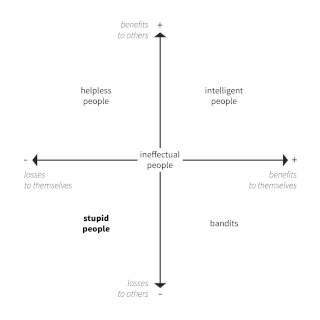Written in 1976 by Carlo M. Cipolla![]() his essay on stupid people, defined as those that by their actions cause losses to others without benefiting themselves, asserts that as a group they are the most powerful force. Beyond evil doers such as organized crime.
his essay on stupid people, defined as those that by their actions cause losses to others without benefiting themselves, asserts that as a group they are the most powerful force. Beyond evil doers such as organized crime.
He provides the following structure to group people by their impact on themselves and others.

Cipolla further asserts five fundamental laws of stupidity:
- Always and inevitably, everyone underestimates the number of stupid individuals in circulation.
- The probability that a certain person (will) be stupid is independent of any other characteristic of that person (e.g., race, sex, age, education, and socioeconomic status). Therefore you cannot recognize them by appearance or status.
- A stupid person is a person who causes losses to another person or to a group of persons while himself deriving no gain and even possibly incurring losses.
- Non-stupid people always underestimate the damaging power of stupid individuals. In particular, non-stupid people constantly forget that at all times and places, and under any circumstances, to deal and/or associate with stupid people always turns out to be a costly mistake.
- A stupid person is the most dangerous type of person.
Corollary: a stupid person is more dangerous than a pillager.
He goes on to provide the following insight into people represented in each quadrant of his matrix:
| Helpless people |
Intelligent people |
|
contribute to society but are taken advantage of by it (and especially by the "bandit" sector of it); note, however, that extreme altruists and pacifists may willingly and consciously (rather than helplessly) accept a place in this category for moral or ethical reasons |
contribute to society and leverage their contributions into reciprocal benefits |
| Stupid people |
Bandits |
| whose efforts are counterproductive to both their and others' interests | pursue their own self-interest even when doing so poses a net detriment to societal welfare |
His work may have been intended as a tongue-in-cheek treatment of the subject but, whatever the tone, it is insightful on the issues of human behavior and the impact of groups. It seems particularly useful to understand important behaviors one might observe in today's environment.

